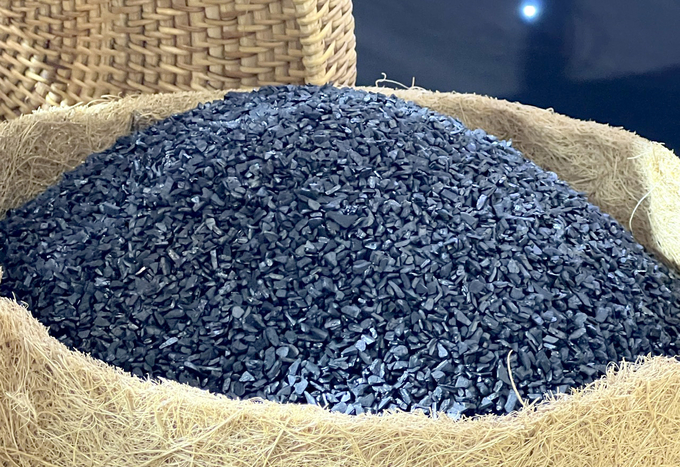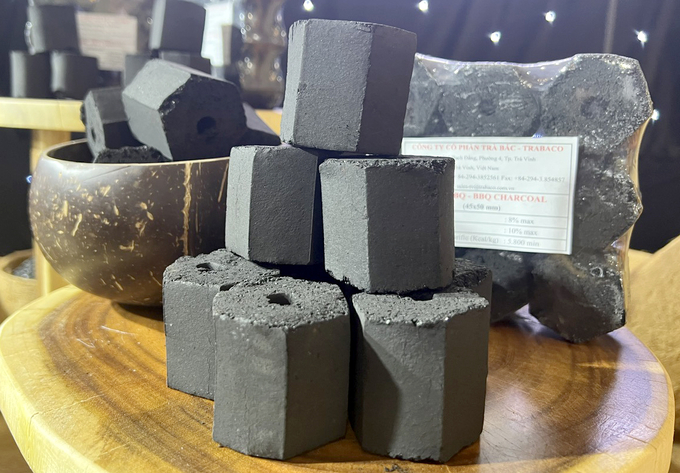November 28, 2025 | 03:51 GMT +7
November 28, 2025 | 03:51 GMT +7
Hotline: 0913.378.918
November 28, 2025 | 03:51 GMT +7
Hotline: 0913.378.918

Activated carbon from Trabaco's coconut shell charcoal. Photo: Son Trang.
At the International Conference on the Coconut Industry (CocoNext 2024) in Ben Tre, a variety of Vietnamese coconut products, including coconut milk and coconut oil, were on display, garnering the attention of both local and international delegates. Trabaco Company's products, which include coir and shells, garnered significant interest among these. These products consist of coconut fiber mats, coconut fibers, pure BBQ charcoal from coconut shell charcoal, and activated carbon from coconut shell charcoal.
Trabaco is acknowledged as one of the foremost enterprises in the production of valuable products from coconut shells and coir, which were previously regarded as byproducts. Trabaco has concentrated on the production of activated carbon from coconut hulls since 1997. Currently, the organization maintains five facilities that are capable of annually producing 7,000 tons of activated carbon from coconut shells. It is also capable of producing pure BBQ charcoal from coconut shells at a rate of 1,800 tons per year, baled coconut fiber at 16,000 tons per year, and knitted coconut fiber carpets that cover 1.5 million square meters annually.
Trabaco is a prominent manufacturer of activated carbon products derived from coconut shells with respect to Vietnam and the global market. The company exports coconut shell-activated carbon to more than 30 countries and territories, including the United States, Canada, the United Kingdom, France, Germany, the Netherlands, Japan, South Korea, China, and Australia. Water filtration, air purification, and gold recovery are among the numerous industries that use these products.
As a product derived from coconut byproducts, coconut charcoal has become one of the key trade commodities in the global coconut industry, with an increasing export value.

BBQ charcoal from coconut shell charcoal. Photo: Son Trang.
Nuwan Chinthaka, Vice President of the International Coconut Community, estimates that the global export value of coconut shell charcoal is approximately USD 1.09 billion, placing it fifth in terms of value, following coconut water, coconut oil, shisha charcoal, and coir products.
The export value of coconut charcoal in Vietnam was USD 88.5 million in 2023, with activated carbon from coconut shells accounting for approximately USD 33 million.
Chinthaka stressed that shisha charcoal has the potential to generate nearly USD 100 million in revenue for Vietnam's coconut exports. Among coconut products, shisha charcoal is the third most valuable export at USD 5.05 billion on a global scale, following coconut oil and coconut water.
Vietnamese businesses should prioritize the production and export of shisha charcoal, a product that is in high demand globally and is being used more frequently in restaurants and households, in addition to coconut charcoal and activated carbon from coconut shells, suggests international experts.
The utilization of coconut hulls and shells to produce coconut charcoal, activated carbon, and shisha charcoal is a sustainable bioenergy approach that promotes a circular economy within the coconut industry. This considerably improves the livelihoods of coconut farmers in numerous countries, including Vietnam, and increases the economic value of coconut trees.
Nevertheless, provinces with the potential to cultivate coconuts must establish designated coconut material zones in order to increase the production and export of coconut products, particularly those that are derived from residues. The current supply of coconuts in the Mekong Delta is dispersed across multiple provinces and cities, which presents a challenge for enterprises involved in the collection, according to Huynh Khac Nhu CEO of Trabaco. In order to obtain raw materials for the production of activated carbon and other products, the company has occasionally been required to import coconuts from Indonesia.
Translated by Linh Linh

(VAN) On November 27, in the meeting with Minister Tran Duc Thang, Mayor Yin Yong shared Beijing’s experience to improve environment and air quality.

(VAN) After 30 years, both sides identified strategic areas of cooperation: sustainable production, increasing coffee value and training for farmers.
/2025/11/27/4910-4-164708_294.jpg)
(VAN) On the afternoon of November 27 in Beijing, Minister of Agriculture and Environment Tran Duc Thang held a working session with several major Chinese enterprises operating in the agriculture and environment sector.

(VAN) The Department of Animal Health issued a provisional guideline requesting local authorities to increase surveillance, collect samples for testing, and conduct epidemiological investigations according to the established procedure.

(VAN) The United Nations recommends that Vietnam utilize data and artificial intelligence to enhance early disaster warnings and reduce GDP losses by 3.2% in the context of climate change.

(VAN) On the morning of November 27 in Beijing, Minister Tran Duc Thang and the Deputy Commissioner General of the General Administration of Customs of China signed a protocol on fresh jackfruit exports.

(VAN) As floodwaters recede, a vast network of irrigation works across eastern Gia Lai is emerging in a state of severe disrepair, with extensive damage demanding urgent restoration ahead of the 2025-2026 winter-spring cropping season.